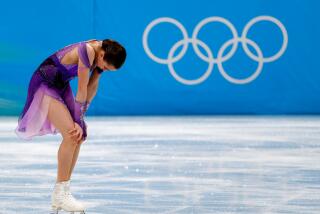Worldwide Anti-Doping Code Is Given Approval
- Share via
Sports bodies and governments from around the globe Wednesday approved a worldwide anti-doping code, a key advance in expressing unity and commitment in what has often been an inconsistent fight against the use of illicit drugs to enhance performance in sports.
Wrapping up a three-day summit in Copenhagen convened by the World Anti-Doping Agency (WADA), 65 sports federations and 73 national governments gave their OK to a blueprint that sets rules, procedures and penalties in all sports and in all countries.
All athletes -- including NBA players who are candidates for national Olympic teams -- will be subject to random, out-of-competition testing. Such tests are the most important means of catching cheaters. A tester can even show up at an athlete’s house, unannounced, to ask for a sample.
The code calls for a two-year suspension for a first serious violation, a life ban for a second. Traditionally, national or international sports federations have been free to impose sanctions -- or not -- at their discretion. The code sets standards for testing and appeals, and includes a long list of banned substances, ranging from steroids to stimulants.
Dick Pound of Canada, the WADA president and a longtime member of the International Olympic Committee, called Wednesday’s approval a “seminal moment” in the anti-doping fight. Frank Shorter, chairman of the U.S. Anti-Doping Agency, called it a “giant step forward.” Danish Sports Minister Brian Mikkelsen said, “We have now formed a united front against cheats in sport.”
Approval came only four years after a world anti-doping conference in Lausanne, Switzerland, where a number of governments attacked the IOC for its uneven record in the anti-doping campaign since the late 1960s. WADA was created later that year, in November 1999.
Tempering the high spirits and soaring rhetoric, however, is the reality: The code must be put into practice.
Sports bodies are required to adopt the code by the start of the 2004 Athens Summer Olympics. Governments have until the 2006 Winter Games in Turin, Italy, to make the code part of their national legal framework.
Jacques Rogge, the IOC president, said, “We will know by February 2006 if this conference was really a success or not. It’s promising, but I want to see the reality.”
The U.S., France, Germany, Russia, Australia and Britain were among the 50 nations signing a declaration backing the code. The other 23 indicated they would sign later.
Rogge said that any nation that doesn’t get on board could be barred from playing host to the Games. Any sport or Olympic entity that doesn’t follow the rules, he said, could be excluded from the Games.
The code does not apply wholesale to U.S. pro leagues -- the NBA, NFL, NHL and Major League Baseball -- because they do not fall under the jurisdiction of the U.S. government or international sports bodies. The leagues were “encouraged to accept” the code.
Individual athletes nominated for an Olympic team will, however, be subject to the rules -- much as NHL players headed to the Salt Lake City Games last year were subjected beforehand to random tests.
Now, NBA stars such as Tracy McGrady, Ray Allen, Tim Duncan, Jason Kidd -- the four who already have been named to the U.S. team for Athens -- similarly will be subjected to such tests. Kobe Bryant is expected to be named to the team later.
“It’ll go very much the same for the NBA players that have been part of our program in the past. That’s been exemplary,” said USADA spokesman Rich Wanninger, referring to tests connected to last year’s world basketball championship in Indianapolis.
“There are some pitfalls,” said Dan Wasserman, spokesman for the National Basketball Players Assn. “There may be some over-the-counter medicines, such as Sudafed,” which contains a chemical cousin of the banned stimulant ephedrine, “that may be illegal for the IOC. That could be touchy.
“But I don’t think that’s a big problem.”
Craig Miller, spokesman for USA Basketball, said, “For us, and for NBA players, it really isn’t going to be different. The only aspect is because we’re going through qualifying we’re identifying the team a little earlier than we usually do.”
Because of last year’s sixth-place finish in Indianapolis, the U.S. men’s team has to go through a zone competition in San Juan, Puerto Rico, Aug. 20-31, with nine other teams. The top three will earn slots in Athens.
Times staff writer Helene Elliott contributed to this report.
More to Read
Go beyond the scoreboard
Get the latest on L.A.'s teams in the daily Sports Report newsletter.
You may occasionally receive promotional content from the Los Angeles Times.






